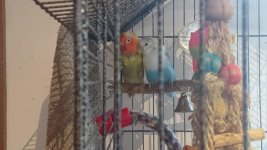P
PF_Guest28045
Guest
Hi everyone,
I have had my two love birds for 8 years now.
since i have had them my two birds have been affraid of me
when we first got the birds they were supposed to be hand reared and fed so they would be easy to hold etc but i think this was a lie.
Initially we would let them out and they had their wings clipped so we made a little ramp so they would climb down and run around etc. We would have to chase them around to pick them up to get them back in. We also tried the hold them in a towel and talk quietly to them but i think this made everything worse.
Anyway that was a long time ago. Ive tried so many things for them to like me, granted i have given up so many times.
It is starting to make me sad that i have these two birds that dont like me. I feel like i am a bad bird owner and maybe i should give them away. I really really really want to bond with them and have them be ok with sitting on me and my hands etc, but if i put my hand near them at all they are scared!
Is this a lost cause because of the time that has gone past?
I did get told previously to seperate them but i guess i am a softy and couldnt bare to seperate them, or is this my only solution.
The male does have missing feathers around his chest and head, and i belive it could be the female biting him ( she is the dominate one ) but the majority of the time they seem to get along.
Does anyone have any solid ideas to my problem? It would break my heart to give them away to someone else but if i am the problem i would do it.
Please any help would be great!
I have attached a picture of them aswell.
I have had my two love birds for 8 years now.
since i have had them my two birds have been affraid of me
when we first got the birds they were supposed to be hand reared and fed so they would be easy to hold etc but i think this was a lie.
Initially we would let them out and they had their wings clipped so we made a little ramp so they would climb down and run around etc. We would have to chase them around to pick them up to get them back in. We also tried the hold them in a towel and talk quietly to them but i think this made everything worse.
Anyway that was a long time ago. Ive tried so many things for them to like me, granted i have given up so many times.
It is starting to make me sad that i have these two birds that dont like me. I feel like i am a bad bird owner and maybe i should give them away. I really really really want to bond with them and have them be ok with sitting on me and my hands etc, but if i put my hand near them at all they are scared!
Is this a lost cause because of the time that has gone past?
I did get told previously to seperate them but i guess i am a softy and couldnt bare to seperate them, or is this my only solution.
The male does have missing feathers around his chest and head, and i belive it could be the female biting him ( she is the dominate one ) but the majority of the time they seem to get along.
Does anyone have any solid ideas to my problem? It would break my heart to give them away to someone else but if i am the problem i would do it.
Please any help would be great!
I have attached a picture of them aswell.
Attachments
Last edited by a moderator:
